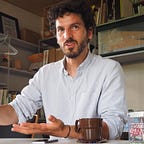Will Climate Change force culture to migrate ?
Wineyard migration as a quick case study revealing how climate might be the only true agent of the permanence of our economical & cultural activities.
When I recently read about the impact of climate change on wineyard in France, I realized that such a story was maybe one of the best way for French people to get what is at stake.
“In 20 years, the English will be making Grenache from Chateauneuf-du-Pape,” says Herve Lethielleux, co-owner of L’Etiquette, a wine boutique in central Paris, about a wine variety from subtropical southeastern France.
To French ears, it means that what is required to produce a champagne wine is a specific location and an indigenous knowledge.
As an example, Champagne wine may only legally be produced in Champagne region, that is to say within a specific geographical area for which we may draw boundaries on a piece of paper. Stating that champagne wine is a champagne region-only product, it is an A.O.C.*.
To French ears, it means that what is required to produce a champagne wine is :
- a specific location, i.e. a specific type of soil, the correct enlightenment and right temperature for the grape
- and an indigenous knowledge, i.e. traditional know-how about grape combination and its slow transformation.
Now guess what: after a couple of climate warming decades, Englishmen will be better off to grow champagne grapes than people living near Reims. I bet that is going to be tough for the Champagnois to let it go…
It is to say that what makes a ‘terroir’ isn’t only the combination of that soil and that indigenous know-how. There is a third ingredient needed to keep the two other ingredients locally relevant : climate.
“There is no longer any doubt that climate change will have a devastating impact on French quality wines. What has taken centuries to create is now at risk of being obliterated. Wine production is a common cultural heritage built over time through specific knowledge and terroirs.” Greenpeace report.
Such a food related topic is a great issue for French people to feel how a cultural heritage that we value so much is related, first to centuries of crafts improvements and, second to complete geo-climatic initial conditions, that are not only defined by geographical boundaries, but by a complete local geo-climatic equilibrium.
We shall acknowledge the importance of climate as the only agent of our economical and cultural permanence.
As climate moves apart for the territorial boundaries we thought it was bound to, the definition of ‘terroir’ does not boil down any more to the ‘territory where some specific traditional knowledge did arise’. As climate dissociate from terrain, it means that wine and most of other A.O.C. products — think about mineral waters for instance, cheeses or liquors — do not stand anymore on a ground that is ‘property’, i.e. may not remained ‘patentable’.
This ‘wine migration’ may be a great usecase to learn that, together with many economical actors of ‘terroir’, we shall acknowledge the importance of climate as an agent of our economical and cultural permanence.
If we don’t, like the Champagne wine makers, we will end up facing the dilema to either migrate — follow the climate to maintain the traditional know-how whatever the geographical territory is — or innovate — update the traditional technics and seeds to remain on the soil of the ancestors whatever the new product will be.
*Terroir, in french, means thelocal soil from which food or products are homegrown. It relates to traditions and indigenous know-how.
**A.O.C., Appelation d’Origine Contrôlée, means P.D.O., Protected Designation of Origin.
update : an article in LeMonde.fr — 7th of November 2015 — “since 30 years, grapes have gain 1° in alcohol every ten years”.
